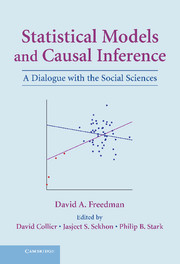Book contents
- Frontmatter
- Contents
- Preface
- Editors' Introduction: Inference and Shoe Leather
- Part I Statistical Modeling: Foundations and Limitations
- Part II Studies in Political Science, Public Policy, and Epidemiology
- Part III New Developments: Progress or Regress?
- 12 On Regression Adjustments in Experiments with Several Treatments
- 13 Randomization Does Not Justify Logistic Regression
- 14 The Grand Leap
- 15 On Specifying Graphical Models for Causation, and the Identification Problem
- 16 Weighting Regressions by Propensity Scores
- 17 On the So-Called “Huber Sandwich Estimator” and “Robust Standard Errors”
- 18 Endogeneity in Probit Response Models
- 19 Diagnostics Cannot Have Much Power Against General Alternatives
- Part IV Shoe Leather Revisited
- References and Further Reading
- Index
13 - Randomization Does Not Justify Logistic Regression
Published online by Cambridge University Press: 05 June 2012
- Frontmatter
- Contents
- Preface
- Editors' Introduction: Inference and Shoe Leather
- Part I Statistical Modeling: Foundations and Limitations
- Part II Studies in Political Science, Public Policy, and Epidemiology
- Part III New Developments: Progress or Regress?
- 12 On Regression Adjustments in Experiments with Several Treatments
- 13 Randomization Does Not Justify Logistic Regression
- 14 The Grand Leap
- 15 On Specifying Graphical Models for Causation, and the Identification Problem
- 16 Weighting Regressions by Propensity Scores
- 17 On the So-Called “Huber Sandwich Estimator” and “Robust Standard Errors”
- 18 Endogeneity in Probit Response Models
- 19 Diagnostics Cannot Have Much Power Against General Alternatives
- Part IV Shoe Leather Revisited
- References and Further Reading
- Index
Summary
Abstract. The logit model is often used to analyze experimental data. However, randomization does not justify the model, so the usual estimators can be inconsistent. A consistent estimator is proposed. Neyman's non-parametric setup is used as a benchmark. In this setup, each subject has two potential responses, one if treated and the other if untreated; only one of the two responses can be observed. Beside the mathematics, there are simulation results, a brief review of the literature, and some recommendations for practice.
Introduction
The logit model is often fitted to experimental data. As explained below, randomization does not justify the assumptions behind the model. Thus, the conventional estimator of log odds is difficult to interpret; an alternative will be suggested. Neyman's setup is used to define parameters and prove results. (Grammatical niceties apart, the terms “logit model” and “logistic regression” are used interchangeably.)
After explaining the models and estimators, we present simulations to illustrate the findings. A brief review of the literature describes the history and current usage. Some practical recommendations are derived from the theory. Analytic proofs are sketched at the end of the chapter.
Information
- Type
- Chapter
- Information
- Statistical Models and Causal InferenceA Dialogue with the Social Sciences, pp. 219 - 242Publisher: Cambridge University PressPrint publication year: 2009
Accessibility standard: Unknown
Why this information is here
This section outlines the accessibility features of this content - including support for screen readers, full keyboard navigation and high-contrast display options. This may not be relevant for you.Accessibility Information
- 2
- Cited by
